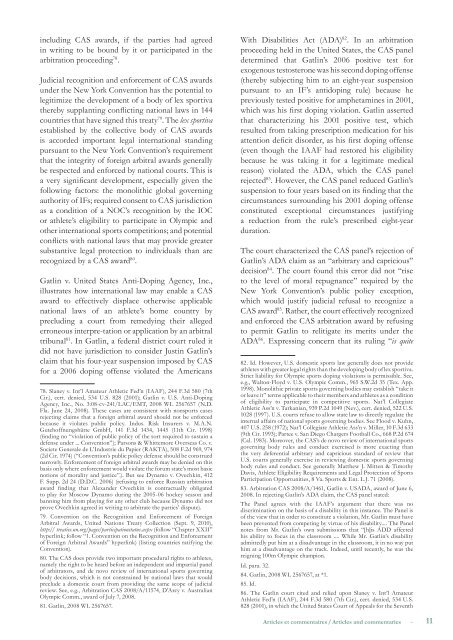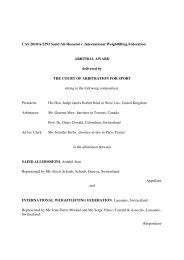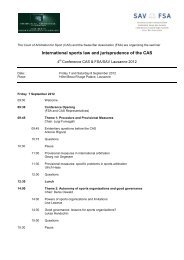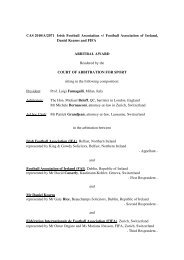(CAS) Bulletin - Tribunal Arbitral du Sport / TAS
(CAS) Bulletin - Tribunal Arbitral du Sport / TAS
(CAS) Bulletin - Tribunal Arbitral du Sport / TAS
Create successful ePaper yourself
Turn your PDF publications into a flip-book with our unique Google optimized e-Paper software.
including <strong>CAS</strong> awards, if the parties had agreed<br />
in writing to be bound by it or participated in the<br />
arbitration proceeding 78 .<br />
Judicial recognition and enforcement of <strong>CAS</strong> awards<br />
under the New York Convention has the potential to<br />
legitimize the development of a body of lex sportiva<br />
thereby supplanting confl icting national laws in 144<br />
countries that have signed this treaty 79 . The lex sportiva<br />
established by the collective body of <strong>CAS</strong> awards<br />
is accorded important legal international standing<br />
pursuant to the New York Convention’s requirement<br />
that the integrity of foreign arbitral awards generally<br />
be respected and enforced by national courts. This is<br />
a very signifi cant development, especially given the<br />
following factors: the monolithic global governing<br />
authority of IFs; required consent to <strong>CAS</strong> jurisdiction<br />
as a condition of a NOC’s recognition by the IOC<br />
or athlete’s eligibility to participate in Olympic and<br />
other international sports competitions; and potential<br />
confl icts with national laws that may provide greater<br />
substantive legal protection to indivi<strong>du</strong>als than are<br />
recognized by a <strong>CAS</strong> award 80 .<br />
Gatlin v. United States Anti-Doping Agency, Inc.,<br />
illustrates how international law may enable a <strong>CAS</strong><br />
award to effectively displace otherwise applicable<br />
national laws of an athlete’s home country by<br />
precluding a court from remedying their alleged<br />
erroneous interpre-tation or application by an arbitral<br />
tribunal 81 . In Gatlin, a federal district court ruled it<br />
did not have jurisdiction to consider Justin Gatlin’s<br />
claim that his four-year suspension imposed by <strong>CAS</strong><br />
for a 2006 doping offense violated the Americans<br />
78. Slaney v. Int’l Amateur Athletic Fed’n (IAAF), 244 F.3d 580 (7th<br />
Cir.), cert. denied, 534 U.S. 828 (2001); Gatlin v. U.S. Anti-Doping<br />
Agency, Inc., No. 3:08-cv-241/LAC/EMT, 2008 WL 2567657 (N.D.<br />
Fla. June 24, 2008). These cases are consistent with nonsports cases<br />
rejecting claims that a foreign arbitral award should not be enforced<br />
because it violates public policy. In<strong>du</strong>s. Risk Insurers v. M.A.N.<br />
Gutehoffnungshütte GmbH, 141 F.3d 1434, 1445 (11th Cir. 1998)<br />
(fi nding no “violation of public policy of the sort required to sustain a<br />
defense under ... Convention”); Parsons & Whittemore Overseas Co. v.<br />
Societe Generale de L’In<strong>du</strong>strie <strong>du</strong> Papier (RAKTA), 508 F.2d 969, 974<br />
(2d Cir. 1974) (“Convention’s public policy defense should be construed<br />
narrowly. Enforcement of foreign arbitral awards may be denied on this<br />
basis only where enforcement would violate the forum state’s most basic<br />
notions of morality and justice”.). But see Dynamo v. Ovechkin, 412<br />
F. Supp. 2d 24 (D.D.C. 2006) (refusing to enforce Russian arbitration<br />
award fi nding that Alexander Ovechkin is contractually obligated<br />
to play for Moscow Dynamo <strong>du</strong>ring the 2005-06 hockey season and<br />
banning him from playing for any other club because Dynamo did not<br />
prove Ovechkin agreed in writing to arbitrate the parties’ dispute).<br />
79. Convention on the Recognition and Enforcement of Foreign<br />
<strong>Arbitral</strong> Awards, United Nations Treaty Collection (Sept. 9, 2010),<br />
http:// treaties.un.org/pages/participationstatus.aspx (follow “Chapter XXII”<br />
hyperlink; follow “1. Convention on the Recognition and Enforcement<br />
of Foreign <strong>Arbitral</strong> Awards” hyperlink) (listing countries ratifying the<br />
Convention).<br />
80. The <strong>CAS</strong> does provide two important proce<strong>du</strong>ral rights to athletes,<br />
namely the right to be heard before an independent and impartial panel<br />
of arbitrators, and de novo review of international sports governing<br />
body decisions, which is not constrained by national laws that would<br />
preclude a domestic court from providing the same scope of judicial<br />
review. See, e.g., Arbitration <strong>CAS</strong> 2008/A/11574, D’Arcy v. Australian<br />
Olympic Comm., award of July 7, 2008.<br />
81. Gatlin, 2008 WL 2567657.<br />
With Disabilities Act (ADA) 82 . In an arbitration<br />
proceeding held in the United States, the <strong>CAS</strong> panel<br />
determined that Gatlin’s 2006 positive test for<br />
exogenous testosterone was his second doping offense<br />
(thereby subjecting him to an eight-year suspension<br />
pursuant to an IF’s antidoping rule) because he<br />
previously tested positive for amphetamines in 2001,<br />
which was his fi rst doping violation. Gatlin asserted<br />
that characterizing his 2001 positive test, which<br />
resulted from taking prescription medication for his<br />
attention defi cit disorder, as his fi rst doping offense<br />
(even though the IAAF had restored his eligibility<br />
because he was taking it for a legitimate medical<br />
reason) violated the ADA, which the <strong>CAS</strong> panel<br />
rejected 83 . However, the <strong>CAS</strong> panel re<strong>du</strong>ced Gatlin’s<br />
suspension to four years based on its fi nding that the<br />
circumstances surrounding his 2001 doping offense<br />
constituted exceptional circumstances justifying<br />
a re<strong>du</strong>ction from the rule’s prescribed eight-year<br />
<strong>du</strong>ration.<br />
The court characterized the <strong>CAS</strong> panel’s rejection of<br />
Gatlin’s ADA claim as an “arbitrary and capricious”<br />
decision 84 . The court found this error did not “rise<br />
to the level of moral repugnance” required by the<br />
New York Convention’s public policy exception,<br />
which would justify judicial refusal to recognize a<br />
<strong>CAS</strong> award 85 . Rather, the court effectively recognized<br />
and enforced the <strong>CAS</strong> arbitration award by refusing<br />
to permit Gatlin to relitigate its merits under the<br />
ADA 86 . Expressing concern that its ruling “is quite<br />
82. Id. However, U.S. domestic sports law generally does not provide<br />
athletes with greater legal rights than the developing body of lex sportiva.<br />
Strict liability for Olympic sports doping violations is permissible. See,<br />
e.g., Walton-Floyd v. U.S. Olympic Comm., 965 S.W.2d 35 (Tex. App.<br />
1998). Monolithic private sports governing bodies may establish “take it<br />
or leave it” terms applicable to their members and athletes as a condition<br />
of eligibility to participate in competitive sports. Nat’l Collegiate<br />
Athletic Ass’n v. Tarkanian, 939 P.2d 1049 (Nev.), cert. denied, 522 U.S.<br />
1028 (1997). U.S. courts refuse to allow state law to directly regulate the<br />
internal affairs of national sports governing bodies. See Flood v. Kuhn,<br />
407 U.S. 258 (1972); Nat’l Collegiate Athletic Ass’n v. Miller, 10 F.3d 633<br />
(9th Cir. 1993); Partee v. San Diego Chargers Football Co., 668 P.2d 674<br />
(Cal. 1983). Moreover, the <strong>CAS</strong>’s de novo review of international sports<br />
governing body rules and con<strong>du</strong>ct exercised is more exacting than<br />
the very deferential arbitrary and capricious standard of review that<br />
U.S. courts generally exercise in reviewing domestic sports governing<br />
body rules and con<strong>du</strong>ct. See generally Matthew J. Mitten & Timothy<br />
Davis, Athlete Eligibility Requirements and Legal Protection of <strong>Sport</strong>s<br />
Participation Opportunities, 8 Va. <strong>Sport</strong>s & Ent. L.J. 71 (2008).<br />
83. Arbitration <strong>CAS</strong> 2008/A/1461, Gatlin v. USADA, award of June 6,<br />
2008. In rejecting Gatlin’s ADA claim, the <strong>CAS</strong> panel stated:<br />
The Panel agrees with the IAAF’s argument that there was no<br />
discrimination on the basis of a disability in this instance. The Panel is<br />
of the view that in order to constitute a violation, Mr. Gatlin must have<br />
been prevented from competing by virtue of his disability.... The Panel<br />
notes from Mr. Gatlin’s own submissions that “[h]is ADD affected<br />
his ability to focus in the classroom .... While Mr. Gatlin’s disability<br />
admittedly put him at a disadvantage in the classroom, it in no way put<br />
him at a disadvantage on the track. Indeed, until recently, he was the<br />
reigning 100m Olympic champion.<br />
Id. para. 32.<br />
84. Gatlin, 2008 WL 2567657, at *1.<br />
85. Id.<br />
86. The Gatlin court cited and relied upon Slaney v. Int’l Amateur<br />
Athletic Fed’n (IAAF), 244 F.3d 580 (7th Cir.), cert. denied, 534 U.S.<br />
828 (2001), in which the United States Court of Appeals for the Seventh<br />
Articles et commentaires / Articles and commentaries<br />
-<br />
11





